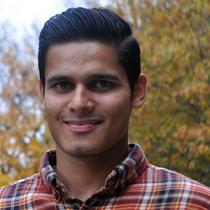
Monteiro Dylan
After graduation, what's your next adventure?
I will begin my master’s program studying propulsion and energy under Professor [Dimitri] Mavris.
What about your next adventure are you most excited about?
I’m looking forward to learning about a particular problem– aircraft propulsion and system design – and then specializing my research to come up with unique results. Ultimately, I want to go into industry, where I will be able to design a propulsion system and integrate it into an aircraft.
Did you have any previous co-op internship or research experience that helped you get to this point?
I co-opped with BorgWarner Turbo Systems in their aerodynamic group where I did a lot on simulation of the compressors and a lot of design optimization. I also co-opped last summer at Rolls Royce in Indianapolis, where I worked on CFD [computational fluid dynamics] codes and testing commercial CFD.
How did your educational experience at Georgia Tech help you achieve your goal?
AE helped me to see what it is like to be an aerospace engineer – what aspects of the field I like, what I don’t like. The work experience was really crucial. After my first co-op I realized I should take really good notes and keep my text books because they actually use this stuff on the job: they don’t ask you to plug something into a computer program to get an answer. They expect you to have a basic understanding of the concepts and create an answer. Tech also gave me a foundation for learning new things on the job– stuff you would not learn in class. On my co-ops I had to learn learned 10 different types of software– proprietary stuff that you need to know to do the job. There’s no secret to that and no shortcuts: I had to practice it until it became easy.
What advice would you give a student who was thinking about following your steps at Georgia Tech's aerospace engineering school?
My biggest regret was not getting involved in research sooner. I would tell anyone coming in to get to know the professors so you can get to know what their research interests are. Then see what you need to do to get involved in research that interest you. Also: go to the career fairs, even if you are not ready to work, so you can get a basic understanding of the interview process and what it’s like to apply for jobs. Apply for anything that looks interesting, too. And, use what you learn on your internships to help you understand what you are learning in class. They are related.